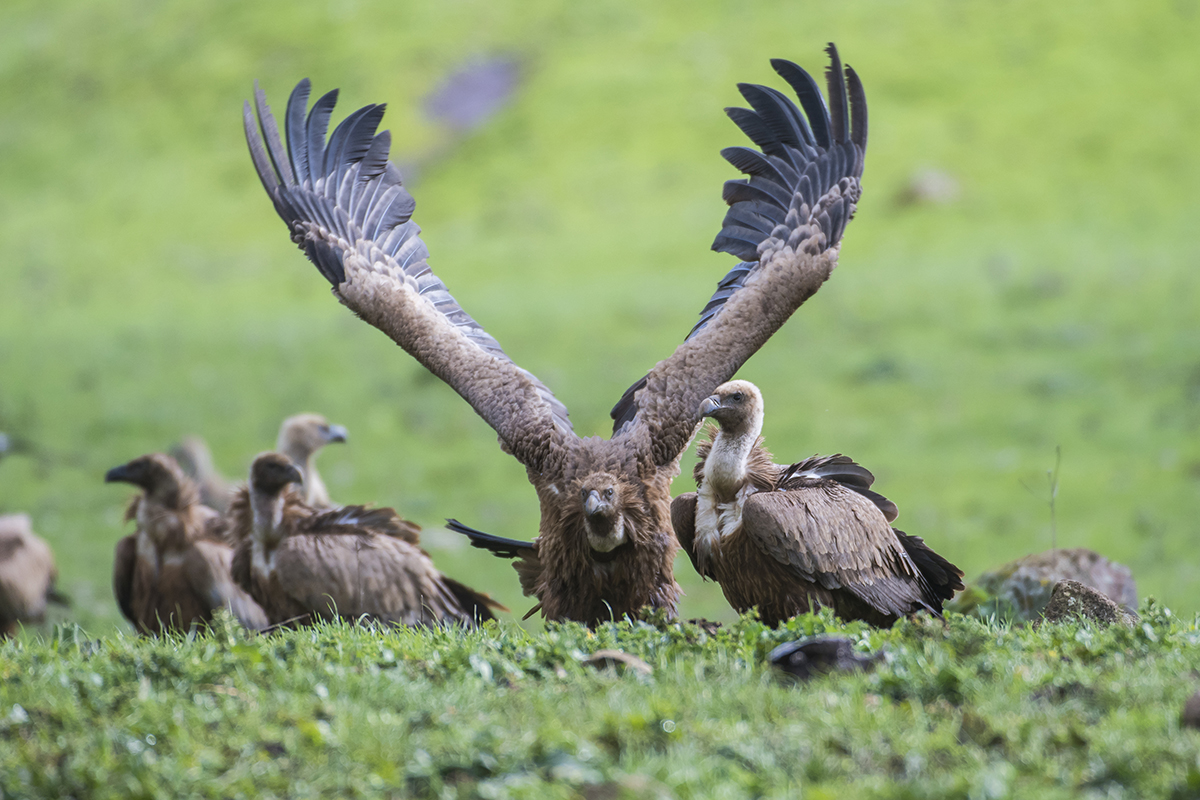
It is a hot July morning in Faia Brava Natural Reserve, located in Portugal, and the stage is set for tagging a Griffon Vulture with the GPS tag. Ecotone Telemetry generously donated a GPS tag to the Vulture Conservation Foundation (VCF), and the VCF decided to donate it to help support the monitoring and conservation actions of another Griffon Vulture or Cinereous Vulture project in Europe. Following a competition that took place in early 2020, the tag was awarded to Rewilding Portugal.
Selecting the right location
The selected site for the capture is a vulture feeding station in the reserve that provides additional food for threatened scavenger birds like the Egyptian Vulture (Neophron percnopterus) and the Cinereous Vulture (Aegypius monachus). Since Griffon Vultures are common in the area, they are frequent visitors during feeding sessions too. After laying out specialized traps, Carlos Pacheco, a vulture expert biologist from Associação Transumância e Natureza (ATNatureza) and André Couto, Rewilding Portugal’s field officer, retreat from the feeding station and wait for the animals to show up.

Capturing an adult Griffon Vulture
Griffons, along with other scavenger birds, show up in a matter of minutes and start flying in circles above the station, but it takes almost two hours for the animals to land and feel safe enough to start feeding. By now, dozens of vultures have gathered and as soon as the first animals start eating, all of them descend in a hurry to get their share. During the feeding frenzy, one Griffon Vulture is finally caught in a trap and the others fly away.

Tagging an adult Griffon Vulture
The biologists are happy with the capture. The Griffon Vulture is an adult, experienced and probably well established in the area, which will provide important data for understanding the ecology of scavenger birds in the region. The vulture is safely removed from the trap and the tagging process starts. The whole procedure takes about half an hour, and besides strapping on the Ecotone tag (with a drop-off system so it falls after a few years when the logger stops working), identification colour and metal rings are placed on the bird’s legs and several biometric parameters are measured.

Releasing ‘Eco’ back to the wild
Afterwards, the vulture, which has been named Eco in honour of Ecotone Telemetry, is ready and eager to be released. As soon as its feet touch the ground, Eco runs and flaps its powerful wings, in the heavy and rough take-off characteristic of this species.
The team watches as the vulture flies above them, using the rising hot air to gain altitude, with a chorus of cicadas signalling that the heat of the day is about to reach its peak. Hopefully, the data collected by Eco will improve the knowledge about scavenger birds in the Greater Côa Valley, and support conservation actions and policy decisions that will lead to a wilder landscape.

Eco now joins a group of other eight Griffon Vultures marked with GPS tags in the Côa Valley, as part of the “Scaling Up Rewilding in Western Iberia” project. You can read more about the objectives of this project and the importance of tagging vultures in this previously published article.
Ecotone Telemetry
Ecotone Telemetry is an association of professional ornithologists, ecologists and specialists in environmental protection. They put together projects and analyses in the field of environmental protection and management. They produce various kinds of GPS telemetry equipment for birds and mammals. Their wildlife trackers are used on all continents including Antarctica.
Scaling Up Rewilding in Western Iberia
The project is financed by the Endangered Landscapes Programme, which is managed by the Cambridge Conservation Initiative and funded by Arcadia, a charitable fund of Peter Baldwin and Lisbet Rausing. The project is being coordinated by Rewilding Europe, in partnership with Rewilding Portugal, the University of Aveiro, Associação Transumância e Natureza and Zoo Logical. Sponsored by Mossy Earth, the tagging of the griffon vultures was carried out by Associação Transumância e Natureza, together with members of the Rewilding Portugal team. As scientific collaborators, CIBIO-InBIO and Movetech provided the other transmitters and are also supporting with data analysis and the dissemination of results.
Sign up to our newsletter and never miss any vulture news!







